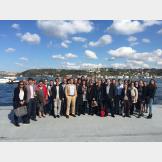On 22-23 April 2015, the MAXCAP FP7 project held its Midterm Conference in Istanbul, Turkey. The Conference presented the current state of achievements of the MAXCAP project with important lessons for European Enlargement and the European Neighbourhood Policy. The conference was attended by more than fifty participants from project partner institutions and its advisory board and from various other institutions, authorities, the European Commission and civil society. Many young researchers also attended MAXCAP’s Midterm conference as it had been preceded by the two-day-long MAXCAP young researchers' conference, hosted by the MAXCAP partner Sabanci University.
The conference presented many interesting and even somehow unexpected results with great policy relevance. MAXCAP research results clearly show that the internal institutional enlargement capacity of the EU is intact. The latest enlargement rounds (2004-2007) have not weakened the EU’s decision making mechanisms, contrary to conventional wisdom. The formal compliance with EU rules and requirements in the Eastern Enlargement has been far better than in the earlier southern enlargements. This shows that the EU was able to learn from earlier experiences and adapt its enlargement strategy in a useful way. This adaptation strategy continues with the new emphasis on the rule of law, justice and democracy negotiation chapters (23 and 24) from the very beginning and all along the accession negotiations in the Western Balkans (and in principle with Turkey with whom the negotiations practically came to a standstill due to both external and internal reasons). Preliminary research results also point towards positive correlation between compliance with EU economic rules and regulations and socio-economic change in new member states from Central and Eastern Europe.
One further striking result came from the discourse analyses of citizens’ understandings on enlargement in member states and candidate countries. Leiden university scholars, in collaboration with numerous MAXCAP partners, interviewed almost 300 citizens in six countries and analyzed more than 6000 authentic statements on past and future enlargements expressed by fellow citizens themselves. Interestingly, the discourses among citizens are far more positive towards EU enlargement than mainstream politics. This is true even in countries like the Netherlands and Germany, supposedly the most influenced by a putative enlargement fatigue.


